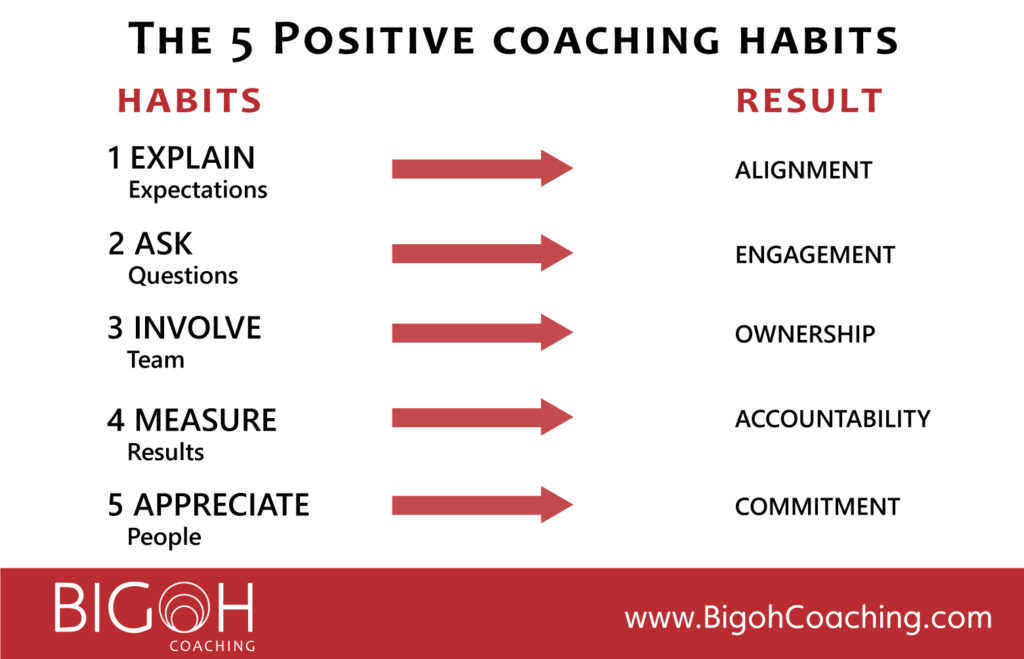19 Oct Developing a Positive Growth Mindset is a Must in My Executive Coaching & Mentoring Practice

As one of South East London’s readily identifiable Coaching and Mentoring Practices, I firmly believe a positive coaching mindset helps my clients.
Using my ‘5 Positive Coaching Habits’, I help my business and professional services clients to authentically and effectively reap the ultimate benefits – positive results, growth and building strong relationships.
? A negative coaching mindset or poor habits inhibit the ability to inspire and yield less than optimal results.
There are five positive coaching habits. And when these habits are applied with a positive coaching mindset, you will predictably inspire winning results and relationships.
These five habits give both the individual and team the biggest boost if applied wholeheartedly and with total commitment to the cause (goal, vision, aspiration of the client).
? The root meaning of the verb “to coach” means to bring a person from where he or she is to where he or she wants to be.
As an inspiring coach, I focus on developing a person’s natural gifts so each team member can realise his or her potential and while shoring up weaknesses to help each team member master his or her job.
Consider the role of a football coach. He sets clear expectations for his team with a game plan to win. He asks players if they have any questions to ensure they are clear about their respective roles on the team.
He also asks them questions like, “How can you improve your performance or overcome a certain obstacle?” Then during the game, he involves them in changing the game plan, if necessary, based on what they are seeing on the field.
The coach also observes and measures each player’s performance (e.g., number of tackles, yards gained, etc.).
Finally, the coach gives constructive feedback and recognition so his players can elevate their performance in the next game…that’s the theory at least.
The same applies to business leaders, top professionals and executives. These same principles are equally transferable to micro and/or small business owners.
I work with my clients to identify:
- Vision
- Mindset
- Skills
- Action Plan
- Culture
- Organisational structure
- Policies and procedures
Not doing so can lead to poor performance, decline, stagnation or exasperation for professional services and businesses alike.
Inadequate Vision or Mindset leads to Uncertainty
This can be an inadequacy of business mind-set at a particular size, or of understanding that different enterprise sizes require a new approach or vision.
Inadequate Skills leads to Incompetence
This means the people involved, need the ability to do the transformation and more importantly, be skilled enough to thrive once the transformation is completed.
Inadequate Organisational Structure leads to Conflict
Different organisational structures at each size are important, as people tend to have inertia to change, not just for fear generated by the unknown, but also because changing takes energy and as such, there needs to be a way to offset that effort.
Inadequate Processes and Procedures leads to Exasperation
Sometimes change requires very little in terms of practical resources, but a lot in terms of the time of the organised and regular responses by individuals involved (i.e. to learn a new way to do things), inadequate processes and procedures slow progress and it is exasperating to see that everything is aligned and ready but does not progress.
Inadequate Action Plan / Company Culture leads to Leaderless Culture
Action plans and activities relating to the culture of the organisation do not have to be too complicated, as small transformative changes can be done with little structure, yet structure has to be there.
For example, it is useful to have one person managing a situation or department that all can follow, providing everyone accepts they are the right person to make things happen.
My role as an Executive Coach and Mentor is to inspire my clients. These are the five positive habits that inspiring coaches in business practise to build winning teams:

- Engage with clients, explain and take the time to ensure alignment with their teams before moving forward.
2. Ask questions to clarify a problem or for ideas and suggestions. Asking questions ignites meaningful client engagement.
3. Involve team members in creating solutions to improve their work. This enlists ownership because people are committed to things they help create.
4. Help identify and clarify appropriate metrics to measure results diligently to boost team accountability.
5. I am a people person, one of my strengths or ‘super-powers’ is my appreciation. This builds commitment to sustaining and improving results.
When the members of an effective team know what is expected of them, they are much more likely to perform to their full potential.
When that understanding spreads across the team, you have set yourself on the path to success.
Communication allows everyone to know where everyone else is at in terms of fulfilling their responsibilities, and that provides a serious layer of accountability.
? Valuable employees don’t want to be the person holding the team back.
Sufficient feedback from the boss and from other team members also allows for course correction if any one task or role has gotten out of sync with the others, saving valuable time and resources before things go awry.
The increase in engagement you’ll get from teammates who trust each other and have honestly bought in will set the wheels in motion for greater productivity and creativity, which leads to increases in both quantity and quality of work produced — a win for everyone.
Think about it…then get in touch. You’ll be surprised at what a good coach can help you achieve.

